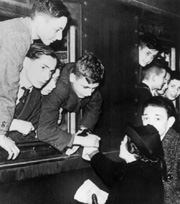HEARING THE ASTONISHING anti-Israel vitriol served up regularly on the BBC, it’s hard to imagine that England was once among the most sympathetic nations to the plight of the Jews during World War II. During the late 1930s, with Nazi terror on the rise, the US Congress determined that its own immigration quotas were all tapped out, sorry. By contrast, the British government agreed to shelter some 10,000 Jewish children from Germany and German-occupied lands—so long as they weren’t accompanied by their parents, who would supposedly crowd the labor market.
INTO THE ARMS OF STRANGERS
directed by Mark Jonathan Harris runs December 15-21 at Varsity
Thus began the kindertransport, one of the most remarkable episodes in the Holocaust saga, and one that has been culturally rediscovered in the last 10 years with a documentary film, several books, a play, and now another film. This latest effort was produced in cooperation with the Holocaust Museum in DC, and it’s an expertly wrought bit of filmmaking that calmly, and with no excess of pathos, lays out the bittersweet story—one that could be called life-affirming only by the utterly degraded standards of the time.
Wisely, the movie does not attempt to idealize its subjects. The dozen or so kinder interviewed, now in their 60s and 70s and living in various parts of the world, are allowed to recall all the mixed emotions that came from being inexplicably uprooted and abandoned by their parents. The filmmakers even managed to find a surviving parent from that era, who recalls loading her daughter onto a train with the promise—not really believing it herself—that they would see each other again. “The hurt is unbelievable,” she says. “That cannot be described.”
Most of the children, of course, never saw their parents again, though one of the most fascinating parts of Strangers deals with a boy who, after 11 years in England, was reunited with his parents (who’d managed to escape from Austria). Typical of the unflinching narrative, this is by no means presented as a saccharine ending.
Director Jonathan Mark Harris is not new to the Holocaust theme; he won an Academy Award for his 1997 documentary about postwar Jewish refugees (The Long Way Home). While he’s no innovative stylist, he masterfully stitches together contemporary interviews with plenty of vivid, and unfamiliar, period footage. (One amazing newsreel shows one of the film’s interviewed subjects arriving in England as a little girl.) The effect is to make Strangers‘ little-known story as historically present for us as it is, so clearly, for those who lived through it.








